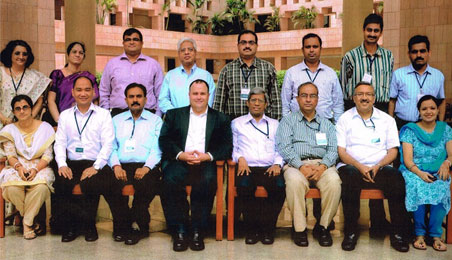
Chairman Machica invested one-week of his time to complete the Executive Education on Risk Management for Banking and Financial Services at the Indian School of Business (ISB) in Hyderabad, India. Seasoned Risk Managers, Finance Executives, CFOs, CEOs, and Risk Consultants from banking, insurance, and other financial institutions housed in the School’s executive housing facility joined the variant class which was conducted on July 31 to August 3, 2012. Mr. Machica was the lone Filipino participant. The Indian School of Business is ranked among the top 20 global business schools offering MBA by Financial Times. ISB is also an associate school of Kellogg School of Management, The Wharton School, and the London School of Business. In December 2011, it became the first South Asia’s business school to earn AACSB accreditation.
Now on its third year, the program was delivered by no less than Professor Russell Walker, Ph.D., an international speaker who is currently the Associate Director at the Zell Center for Risk Research and Professor at Kellogg School of Management, Northwestern University in Illinois. Dr. Russell handles the same program at Kellogg and is said to have expertise on the Application of Analytics in Business and Risk Management. He is also an adviser of many international firms on projects centered on risk management.
The learning gained from the course can be summarized in three perspectives:
- Detailed approaches to enterprise risk management in the new environment with special emphasis on operational risk management. It had thorough discussions on Credit and Market Risk in the context of Basel II accepted techniques for risk management.
- The implications of risk management on Corporate Strategy by having executive perspective on the Basel II accords and the appropriate regulatory calculations and value- at-risk techniques.
- Understanding the role of liquidity risk and other risks in today’s environment and how financial institutions should prepare for the compounding of risks while moving forward. Examining the approaches for calculating operational risk and in resolving the needed regulatory capital was also discussed.
Furthermore, the program covered international research on the various risks and issues regarding market downturn, prolonged economic recovery, and the outlook of US and global economies. In the recent economic state, the role or risk professionals in handing operational risk cannot be overemphasized. It also elaborated advanced approaches to credit, market, and liquidity. It provided clear conceptual framework in identifying, managing risk as well as in dealing risks associated in complex operations such as international supply chains and outsourcing. Most of all, the new role of the Chief Risk Officer has been well-defined allowing participants to internalize their great responsibility as risk managers. Included in the curriculum were case studies discussed and deliberated including those of Nokia, Carter Racing, Society Generali, British Petroleum, Conseco, JP Morgan Case, and Toyota Motors. The cases reinforced the different corporate risks and, more importantly, how the companies failed or succeeded at managing them.
According to our Chairman, he considers the experience as an important milestone for him to best serve the Philippine financial services sector. Further, he shares that the course had real-time intervention enabling all participants to stay relevant in dynamic business scenarios. More than an academic achievement, it opens opportunities and widens access of networks in the corporate world. It is what the Indian School of Business calls as “real results” where application is as vital as the learning itself.
The Kellogg School of Management of Northwestern University served as the Education Provider of the entire course on Risk Management for Banking and Financial Services at the Indian School of Business. Kellogg’s Executive Programs serve a wide range of executive students with specific objectives and are designed for executives looking for cross-functional management and leadership training. It helps every organization develops a leading role in the global playing field. It prepares the students for the challenges and opportunities in today’s global marketplace. ISB collaborated with the said school to be able to bring the program to India in particular and to Asia in general.
Lastly, his one-week trip was truly a personal experience of what the widely talked “Incredible India” is all about – from the class diversity, outstanding facilities, accomplished lecturer, comprehensive and leading course materials to the immersion of India’s food, culture, and people.

